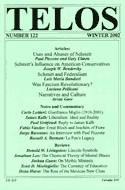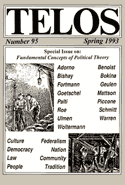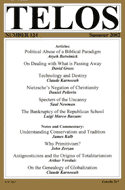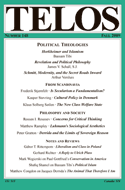By Michael Millerman · Tuesday, August 12, 2014  Like Spinoza, many liberal thinkers have defined the liberty they promote in terms of the necessity of submitting to the law that guarantees it. This is a unique kind of rule of law, a rule of the “‘politically correct,’ universalist, managerial-liberal” (9) law of contemporary liberals. Both internationally and domestically, this law requires the muscular imposition of questionable political, moral, and economic principles, by means of an insidious and often nauseating bureaucratic, technocratic, mediacratic apparatus, onto largely unwilling publics. Crucially, the freedom championed by such liberals and allegedly secured by their law does not include the freedom to refuse their domination root and branch. Like Spinoza, many liberal thinkers have defined the liberty they promote in terms of the necessity of submitting to the law that guarantees it. This is a unique kind of rule of law, a rule of the “‘politically correct,’ universalist, managerial-liberal” (9) law of contemporary liberals. Both internationally and domestically, this law requires the muscular imposition of questionable political, moral, and economic principles, by means of an insidious and often nauseating bureaucratic, technocratic, mediacratic apparatus, onto largely unwilling publics. Crucially, the freedom championed by such liberals and allegedly secured by their law does not include the freedom to refuse their domination root and branch.
Continue reading →
By Michael Millerman · Wednesday, February 5, 2014 As an occasional feature on TELOSscope, we highlight a past Telos article whose critical insights continue to illuminate our thinking and challenge our assumptions. Today, Michael Millerman looks at Carl Schmitt’s “Appropriation/Distribution/Production: Toward a Proper Formulation of Basic Questions of any Social and Economic Order” from Telos 95 (Spring 1993). Carl Schmitt’s The Nomos of the Earth in the International Law of the Jus Publicum Europaeum is available for purchase in our store.
 As indicated by its title, Carl Schmitt’s essay addresses to two problems: (1) what are the basic questions that we must raise about the social and the economic order? (2) how are those questions properly formulated? A moment’s reflection should reveal to us the great generality of these problems, which are designed—so Schmitt says—to answer a need for “comprehensive consideration” of social life in its unity (52). Whether we are asking about orders democratic, non-democratic, capitalist, or socialist; whether we inquire into totalitarianisms, fascisms, traditionalisms, ethno-nationalisms; whether we put the question to republics or princedoms, Schmitt is indicating that there are basic questions to ask, and he is suggesting that he has the key to their proper formulation. As indicated by its title, Carl Schmitt’s essay addresses to two problems: (1) what are the basic questions that we must raise about the social and the economic order? (2) how are those questions properly formulated? A moment’s reflection should reveal to us the great generality of these problems, which are designed—so Schmitt says—to answer a need for “comprehensive consideration” of social life in its unity (52). Whether we are asking about orders democratic, non-democratic, capitalist, or socialist; whether we inquire into totalitarianisms, fascisms, traditionalisms, ethno-nationalisms; whether we put the question to republics or princedoms, Schmitt is indicating that there are basic questions to ask, and he is suggesting that he has the key to their proper formulation.
Continue reading →
By Michael Millerman · Tuesday, July 16, 2013 As an occasional feature on TELOSscope, we highlight a past Telos article whose critical insights continue to illuminate our thinking and challenge our assumptions. Today, Michael Millerman looks at Luigi Marco Bassani’s “The Bankruptcy of the Republican School,” from Telos 124 (Summer 2002).
 Luigi Marco Bassani’s essay “The Bankruptcy of the Republican School” (2002) consists of an overview of the conflict in American historiography between two schools of thought. The first—Lockean liberalism—insists that America was founded on principles that recognize an abstract, natural right to life, liberty, property, and the pursuit of one’s private happiness. These natural rights are liberties that define a private sphere, to be protected from government interference. By contrast, the second school proclaims that not Lockean liberalism, but rather republicanism informed the Founders’ vision of what America is and should be. Republicanism elevates such notions as “the common good” and “the public sphere” above those of “individual liberties” and “private happiness.” Indeed, it can justify infringing on the latter for the sake of the former. Hence, it is in conflict with Lockean liberalism. Luigi Marco Bassani’s essay “The Bankruptcy of the Republican School” (2002) consists of an overview of the conflict in American historiography between two schools of thought. The first—Lockean liberalism—insists that America was founded on principles that recognize an abstract, natural right to life, liberty, property, and the pursuit of one’s private happiness. These natural rights are liberties that define a private sphere, to be protected from government interference. By contrast, the second school proclaims that not Lockean liberalism, but rather republicanism informed the Founders’ vision of what America is and should be. Republicanism elevates such notions as “the common good” and “the public sphere” above those of “individual liberties” and “private happiness.” Indeed, it can justify infringing on the latter for the sake of the former. Hence, it is in conflict with Lockean liberalism.
Continue reading →
By Michael Millerman · Tuesday, April 30, 2013 As an occasional feature on TELOSscope, we highlight a past Telos article whose critical insights continue to illuminate our thinking and challenge our assumptions. Today, Michael Millerman looks at Frederik Stjernfelt’s “Secularism is Fundamentalism! The Background to a Problematic Claim,” from Telos 148 (Fall 2009). Frederik Stjernfelt and Jens-Martin Eriksen’s The Democratic Contradictions of Multiculturalism is also available from Telos Press in our online store.
 What Leo Strauss demonstrated in his studies on the foundations and crisis of liberalism—an achievement that continues to bring both honor and infamy to his name—recurs in the guise of an unsolved problem in both the popular press and in learned company as a debate over the question of whether secularism is what it ostensibly opposes: a rigid fundamentalism. In these circles, the question is provoked less by purely theoretical considerations than by such utterances in the public sphere as are bound to infuriate a sect’s opponents, or confirm them in their suspicions: the Christian American Family Association‘s director of issues analysis refers to “secular fundamentalists” as “the American Taliban”; Quebec Cardinal Marc Oullet, who had a chance to become Rome’s new Pope, complains of “secular fundamentalism” and the “dictatorship of relativism” when defending the Catholic faith; the inquisitor Simon Blackburn quips that a recent book by an established and respected philosopher, who questions the materialistic atheism of the day, ought to be blacklisted as prohibited reading. What Leo Strauss demonstrated in his studies on the foundations and crisis of liberalism—an achievement that continues to bring both honor and infamy to his name—recurs in the guise of an unsolved problem in both the popular press and in learned company as a debate over the question of whether secularism is what it ostensibly opposes: a rigid fundamentalism. In these circles, the question is provoked less by purely theoretical considerations than by such utterances in the public sphere as are bound to infuriate a sect’s opponents, or confirm them in their suspicions: the Christian American Family Association‘s director of issues analysis refers to “secular fundamentalists” as “the American Taliban”; Quebec Cardinal Marc Oullet, who had a chance to become Rome’s new Pope, complains of “secular fundamentalism” and the “dictatorship of relativism” when defending the Catholic faith; the inquisitor Simon Blackburn quips that a recent book by an established and respected philosopher, who questions the materialistic atheism of the day, ought to be blacklisted as prohibited reading.
Continue reading →
|
|
 Like Spinoza, many liberal thinkers have defined the liberty they promote in terms of the necessity of submitting to the law that guarantees it. This is a unique kind of rule of law, a rule of the “‘politically correct,’ universalist, managerial-liberal” (9) law of contemporary liberals. Both internationally and domestically, this law requires the muscular imposition of questionable political, moral, and economic principles, by means of an insidious and often nauseating bureaucratic, technocratic, mediacratic apparatus, onto largely unwilling publics. Crucially, the freedom championed by such liberals and allegedly secured by their law does not include the freedom to refuse their domination root and branch.
Like Spinoza, many liberal thinkers have defined the liberty they promote in terms of the necessity of submitting to the law that guarantees it. This is a unique kind of rule of law, a rule of the “‘politically correct,’ universalist, managerial-liberal” (9) law of contemporary liberals. Both internationally and domestically, this law requires the muscular imposition of questionable political, moral, and economic principles, by means of an insidious and often nauseating bureaucratic, technocratic, mediacratic apparatus, onto largely unwilling publics. Crucially, the freedom championed by such liberals and allegedly secured by their law does not include the freedom to refuse their domination root and branch.  As indicated by its title, Carl Schmitt’s essay addresses to two problems: (1) what are the basic questions that we must raise about the social and the economic order? (2) how are those questions properly formulated? A moment’s reflection should reveal to us the great generality of these problems, which are designed—so Schmitt says—to answer a need for “comprehensive consideration” of social life in its unity (52). Whether we are asking about orders democratic, non-democratic, capitalist, or socialist; whether we inquire into totalitarianisms, fascisms, traditionalisms, ethno-nationalisms; whether we put the question to republics or princedoms, Schmitt is indicating that there are basic questions to ask, and he is suggesting that he has the key to their proper formulation.
As indicated by its title, Carl Schmitt’s essay addresses to two problems: (1) what are the basic questions that we must raise about the social and the economic order? (2) how are those questions properly formulated? A moment’s reflection should reveal to us the great generality of these problems, which are designed—so Schmitt says—to answer a need for “comprehensive consideration” of social life in its unity (52). Whether we are asking about orders democratic, non-democratic, capitalist, or socialist; whether we inquire into totalitarianisms, fascisms, traditionalisms, ethno-nationalisms; whether we put the question to republics or princedoms, Schmitt is indicating that there are basic questions to ask, and he is suggesting that he has the key to their proper formulation.  Luigi Marco Bassani’s essay “The Bankruptcy of the Republican School” (2002) consists of an overview of the conflict in American historiography between two schools of thought. The first—Lockean liberalism—insists that America was founded on principles that recognize an abstract, natural right to life, liberty, property, and the pursuit of one’s private happiness. These natural rights are liberties that define a private sphere, to be protected from government interference. By contrast, the second school proclaims that not Lockean liberalism, but rather republicanism informed the Founders’ vision of what America is and should be. Republicanism elevates such notions as “the common good” and “the public sphere” above those of “individual liberties” and “private happiness.” Indeed, it can justify infringing on the latter for the sake of the former. Hence, it is in conflict with Lockean liberalism.
Luigi Marco Bassani’s essay “The Bankruptcy of the Republican School” (2002) consists of an overview of the conflict in American historiography between two schools of thought. The first—Lockean liberalism—insists that America was founded on principles that recognize an abstract, natural right to life, liberty, property, and the pursuit of one’s private happiness. These natural rights are liberties that define a private sphere, to be protected from government interference. By contrast, the second school proclaims that not Lockean liberalism, but rather republicanism informed the Founders’ vision of what America is and should be. Republicanism elevates such notions as “the common good” and “the public sphere” above those of “individual liberties” and “private happiness.” Indeed, it can justify infringing on the latter for the sake of the former. Hence, it is in conflict with Lockean liberalism.  What Leo Strauss demonstrated in his studies on the foundations and crisis of liberalism—an achievement that continues to bring both honor and infamy to his name—recurs in the guise of an unsolved problem in both the popular press and in learned company as a debate over the question of whether secularism is what it ostensibly opposes: a rigid fundamentalism. In these circles, the question is provoked less by purely theoretical considerations than by such utterances in the public sphere as are bound to infuriate a sect’s opponents, or confirm them in their suspicions: the
What Leo Strauss demonstrated in his studies on the foundations and crisis of liberalism—an achievement that continues to bring both honor and infamy to his name—recurs in the guise of an unsolved problem in both the popular press and in learned company as a debate over the question of whether secularism is what it ostensibly opposes: a rigid fundamentalism. In these circles, the question is provoked less by purely theoretical considerations than by such utterances in the public sphere as are bound to infuriate a sect’s opponents, or confirm them in their suspicions: the 

